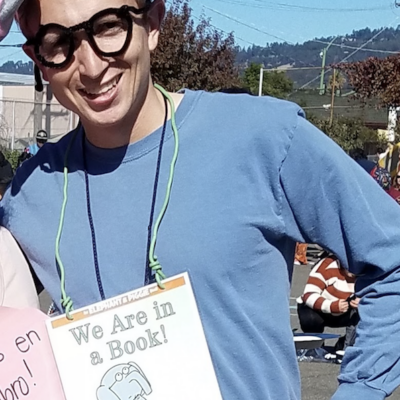MG Bertrand - Migration and Language
Since graduating, MG has taught at two elementary schools in East Oakland: Bridges Academy at Melrose and St. Elizabeth Elementary School. He is dedicated to student voice. At Bridges, he created and oversaw the student council, supporting representatives in planning school-wide initiatives and communicating with leadership. To empower 3rd-5th grade students to pursue their college goals, he designed and co-coordinated college and leadership assemblies. The presenters included Liliana Iglesias, Director of UC Berkeley’s Undocumented Students Program, and Dr. César Cruz, co-founder of Homies Empowerment. As a first grade teacher at St. Elizabeth, he has led parent-teacher conferences in Spanish and English, as well as facilitated meetings and district workshops about best practices with the help of veteran teachers. On a daily basis, MG works to create opportunities in his classroom for peer collaboration, student agency, and accelerated academic growth. Nothing can replace the relationships he has had on a first-name basis with the 440+ students at Bridges. With these experiences, he is looking forward to pursuing a Master’s degree.
Area of Concentration Courses
Chicano Studies 159 - Mexican Immigration
Education 188 - Latinas/os and Education: Critical Issues and Perspectives
Ethnic Studies 136 - Immigrant Women
German C109 - Language & Power
Legal Studies 132AC - Immigration and Citizenship
Ethnic Studies 101A - Social Science Methods in Ethnic Studies
Thesis
Children of the Vines: Language and Power in the Napa Valley’s Dual Immersion Schools
Through interviews with school administrators and teachers, demographic data, and the language of federal education grants, MG’s honors thesis presents a case study that centers on two dual immersion elementary-level public schools, highlighting the treatment of the non-English language, and the accompanying conceptual framework. Offering additional, differentiated resources for greater educational equity is a challenge for communities shaped by imbalances of power. The presence of students and families from often polarized linguistic, ethnic/racial, and socioeconomic backgrounds creates competing needs, leading to situations that can compromise the needs of students who speak the non-dominant language. Given the shortage of bilingual teachers in California, dual immersion schools, faced with choices between international teachers and U.S.-based teachers, make decisions reflecting distinct values and perceptions of language and culture. In the Napa Valley, a rural community with an economy heavily based on the wine industry, there are a significant number of students of Spanish-speaking homes and heritage. As part of an ongoing demographic shift, these students, with the capacity to develop biliteracy and bilingualism, have specific pedagogical, linguistic, and cultural needs. To achieve equity in a Spanish/English dual immersion school, it is not enough to add Spanish to the school curriculum and hire teachers who speak Spanish. The Spanish language is not neutral and generic. Engagement between the school, the students, and the parents depends on communication in the language of the home. Equity depends on teachers and administrators being willing and committed to providing the cultural and linguistic space for students to develop their identities. The students’ abilities to connect with themselves, their families, and their cultural worlds are at stake.
